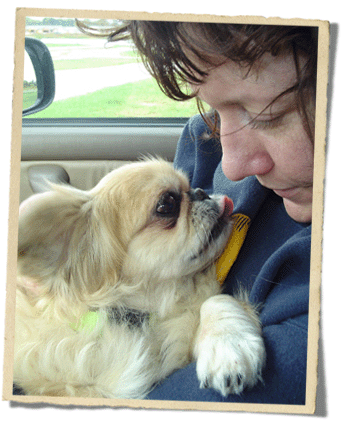
HOME
 YOUR HISTIO STORY
YOUR HISTIO STORY
I am looking for similarities
in all individual cases of
Histiocytic diseases.
I wonder if we all tell our
stories we might come up
with some commonality
between the specific
situations in which all of
our pets got this disease.
So please email me the
details and I'll put your
pets story on Shelley's
Histio Website
 UW HISTIO VERHAAL
UW HISTIO VERHAAL
Ik ben op zoek naar
overeenkomsten in alle
individuele gevallen van
Histiocytose.
Ik hoop dat wanneer wij
onze Histio verhalen
vertellen, wij overeen-
komsten ontdekken over
de manier waarop onze
huisdieren deze ziekte
hebben opgelopen.
Stuur mij de details en
ik zal het verhaal van uw
huisdier op de Histio
website van Shelley zetten.
 WARNING !
WARNING !
These stories are all
different. Individual
symptoms, situations
and circumstances
may vary and response to
therapy is not always the
same.
- Disclaimer -
 WAARSCHUWING !
WAARSCHUWING !
Deze verhalen zijn allemaal
verschillend. Individuele
symptomen, situaties en
omstandigheden kunnen
verschillen en de reactie
op therapie is niet altijd
hetzelfde.
- Disclaimer -
HISTIOCYTOSIS IN
OTHER LANGUAGES
German - Hund
Maligner Histiozytose
French - Chien
l'Histiocytose Maligne
Italian - Canis
Maligni Histiocytosis
Spanish - Perros
Histiocitosis Maligna
Dutch - Hond
Maligne Histiocytose
HOME
Bailey
Malignant Histiocytosis
Pekingese
Male
Date of birth unknown / died on October 10, 2005


By Staci Ramrakha
We lost our Pekingese, Bailey, to malignant histiocytosis on October 10, 2005. We adopted Bailey 4 years ago and thought he was around four at the time. My husband always said he looked older though, plus, he developed arthritis and really started slowing down about two years ago. The vet who diagnosed him with malignant histio thought he might be older as well. So, our best guess is he was somewhere between 9 and 13 years of age. In my heart, he was only four and half, the number of years we had him. He was truly a special dog, and I could write an entire book about that, but that isn't the purpose of this post. I want to tell Bailey's story regarding malignant histio in the hopes it will help other pet owners dealing with this, particularly for those breeds in which histio is considered rare.
Bailey's first signs of illness came only a month before he died. He had jumped off the deck we were building, and we thought he hurt his back. We gave him an anti-inflammatory pill and limited his activity, which normally works for this. After about a week, he was getting worse, so we took him to the vet who gave him a steroid shot and steroids to take at home. We gave this a week, but it wasn't working, and he was steadily getting worse. He had gone from having what seemed like painful incidents where he froze up for a few seconds, to hardly being able to walk and kind of shaking his head like he had Parkinson's.
We took him back to the vet after 10 days on the steroids, and the vet did X-rays, expecting to find a herniated disc, which is common in Pekingese and would be very likely in one that had injured himself jumping off the deck. The X-ray showed his arthritis but no obvious signs of a herniated disc. However, the vet felt like we couldn't truly rule this out without an MRI. Also, he felt like some of the signs Bailey was showing were more neurological than spinal related, suggesting something might be going on with his brain.
I had done some research online, and I knew if Bailey did have a herniated disc, he would need surgery and that the best place for this was a university. So we suggested this to our vet, and he agreed we should go to the University of Missouri vet school. We went two days later expecting to pay for an extremely expensive back surgery, but instead found out the devastating news that Bailey had malignant histiocytosis and there was no cure. His symptoms were all due to severe anemia rather than an injured back.
We went home and made him as comfortable as possible. The vet had given us a chemo pill and told us his prognosis was poor. Most of his organs had tumors, and they said we could expect only two or three months at best. This was on Wednesday. We spent the next couple of days spending time with our dogs and giving Bailey as much love as possible. I have a buggy I push him and my other Peke around in, and we went to the park every day. On Sunday afternoon, Bailey developed diarrhea with blood in it. We called the vet, and she said it was most likely a bleeding ulcer from the steroids. She gave us some medicine to coat his stomach. That night, Bailey continued to bleed. We called the vet at 10:00, and she said since it was just blood now and no stool, it was probably the cancer rather than an ulcer. She told us to bring him in first thing in the morning and she would give him fluids etc.
We stayed up with him most of the night-some of it he just wanted to be by himself. We debated off and on all night whether it was time to put him to sleep. Our vet had said she'd be available no matter what time of day or night. By 6:00 in the morning, he was having trouble breathing. We decided it was time and called our vet. We could have tried treating him, but we decided we didn't want to keep him alive only to have another night like he had. Our vet met us outside, and by this time, Bailey had lost so much blood, she had a hard time finding a vein. Finally, she did, and with both me and my husband holding him, Bailey passed away. While our hearts were torn apart, we both felt a great sense of peace when it was over. I'm pretty sure Bailey felt the peace as well. We gave our dog the last gift and perhaps one of the best we could-an end to his suffering.
Besides the pain of losing Bailey which will always hurt, one of the things I found the hardest to deal with (and still do) is why did my Pekingese get a rare cancer? Until I found this site, I couldn't find any references to breeds other than Bernese Mt dogs or retrievers. My speculation is that this probably isn't that rare in other breeds, it's just rarely diagnosed. The vet at the university told me it would have been almost impossible for our local vet to diagnose this. Bailey saw five different specialists at the university including a neurologist and oncologist and had a number of expensive tests on equipment that just isn't available at a local vet.
With as fast as Bailey declined, had we not gone to the university, I'm certain we would have lost him and not known exactly what had happened. Our vet might ultimately have diagnosed him with cancer, but probably not malignant histio. It's really hard to say I guess.
I've spent that last two weeks wondering what did we do wrong. Was it the park we walked in? Another dog there recently died of cancer. Maybe the chemicals on our lawn? The food he ate previous to us? Genetics? But how could it be genetics when he's not a Bernese Mt dog? Sadly, I will probably never know the why and how, but I have come to the conclusion that it was just Bailey's time.
I found a reference in a book that I want to share because it might be helpful to others. We often think that it wasn't our pet's time to go--that it was too soon. But obviously that isn't true because our pet did indeed die. Regardless of how our pet is taken, cancer, an accident, whatever, it truly was his or her time. We have no control over the universe. This is a hard thing to accept when it comes to our pets because we have ultimately been responsible for and had control over all aspects of their lives. Now all of a sudden, that control is taken away.
For myself, I find peace in knowing that Bailey was loved in his final years and had the best home a dog could possibly have. In return, he taught us about love and trust, lessons which will stay with us forever.
I hope someone reading this has found some comfort in knowing they are not alone.

